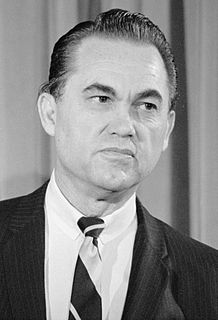A Quote by George Wallace
I did nothing worse than Lyndon Johnson. He was for segregation when he thought he had to be. I was for segregation, and I was wrong. The media has rehabilitated Johnson; why won't it rehabilitate me?
Related Quotes
My recurring nightmare is that someday I will be faced with a panel: Franklin Roosevelt, John Kennedy and Lyndon Johnson all of whom will be telling me everything I got wrong about them. I know that Johnson's out there saying, 'Why is it that what you wrote about the Kennedys is twice as long as the book you wrote about me?'
My recurring nightmare is that someday I will be faced with a panel: Franklin Roosevelt, John Kennedy and Lyndon Johnson all of whom will be telling me everything I got wrong about them. I know that Johnson's out there saying, 'Why is it that what you wrote about the Kennedys is twice as long as the book you wrote about me?
Now in my view, if you were to line up the Presidents in the order of who made the greatest accomplishments, you'd put Lyndon Johnson in that arena with both Roosevelts probably, and [Abraham] Lincoln and so on. But the idea that Lyndon Johnson was operating as a free agent and coming up with these ideas on his own is nonsense.
I had, in college, a professor called Walter Jackson Bate, and he taught a course called The Age of Johnson. It's about Samuel Johnson and his period, 18th-century British writing. So we all got to endure Samuel Johnson, and Boswell's 'Life of Johnson' is now my favorite book. I read it all the time I can; it's great for going to sleep.




























